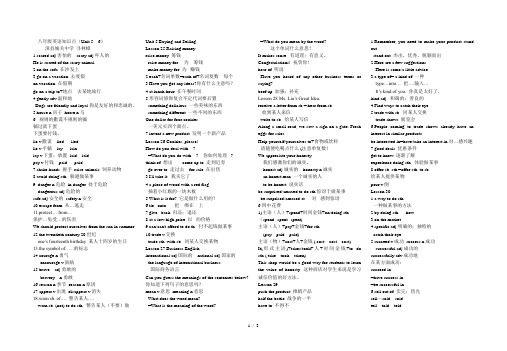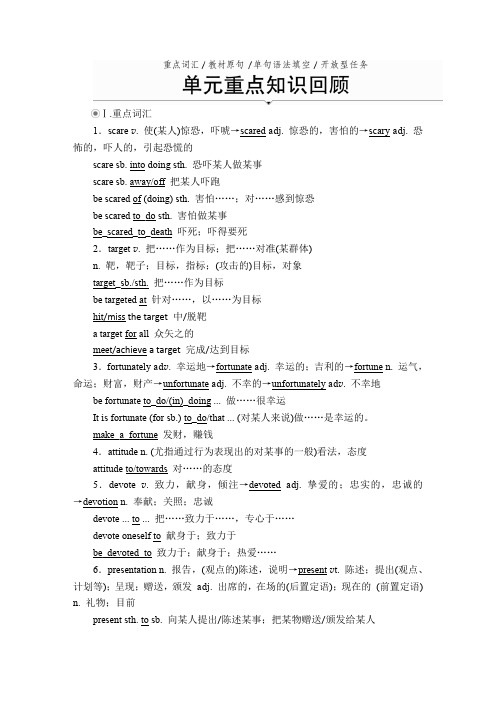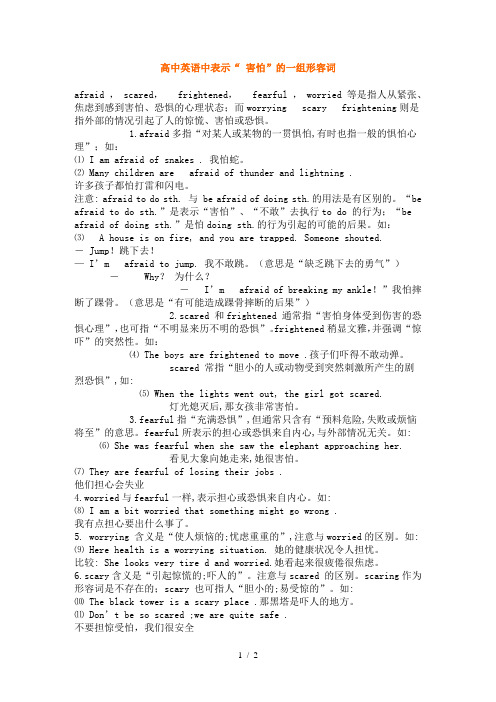scary 和scared的区别
- 格式:doc
- 大小:20.00 KB
- 文档页数:1

Unit 6 The Unexplained词汇精讲精练:词汇精讲1. smell(1)smell作实义动词,意为“闻”。
例如:Please smell the soup! 请闻闻这汤!(2)smell作系动词,意为“闻起来”,后接形容词作表语。
例如:Dinner smells good. 晚饭闻起来很香。
【拓展】类似smell作系动词的词还有:look(看上去);feel(感觉起来、摸上去);sound(听起来);taste(品尝)等。
例如:The music sounds beautiful. 这首音乐听起来很美。
The food tastes good. 食物尝上去很香。
注意:smell; look等系动词不同于系动词be,它们在变疑问句或否定句时不能简单地提到主语之前或加not,而是要通过助动词do/does/ did等来帮助实现。
例如:Does it smell nice? 它闻起来很好吗?The chicken doesn’t taste good. 鸡肉尝起来不好。
How do the children look? 孩子们看起来怎么样?2. taste(1)taste作及物动词,意为“尝,尝出”,后常接表示物品的名词或代词作宾语。
例如:He tasted the bread. 他尝了尝这面包。
Can you taste the mutton in the soup? 你能尝出汤里的羊肉味吗?(2)taste作连系动词,意为“尝起来”,后接形容词作表语。
例如:The food tastes good. 这食物尝起来很好。
(3)taste作名词,意为“味道,滋味”。
例如:I don’t like the taste of the cheese. 我不喜欢这奶酪的味道。
3. searchsearch作不及物动词,意为“搜索,搜寻”。
search for意为“搜寻,找寻”,其后跟被搜寻的人或物。

八年级英语知识点(Unit 5---6)漳县城关中学寻林峰1.scared adj.害怕的scary adj.吓人的He is scared of the scary animal.2.on the sofa 在沙发上3.go on a vacation 去度假on vacation 在假期go on a trip to+地点去某地旅行4.gently adv.温和地Dogs are friendly and loyal.狗是友好的和忠诚的。
5.house n.房子horse n.马6. 规则的撒谎不规则的躺躺过就下蛋下蛋要付钱。
lie v.撒谎lied liedlie v.平躺lay lainlay v.下蛋;放置laid laidpay v.付钱paid paid7.shake hands 握手raise animals 饲养动物8.avoid doing sth. 躲避做某事9. danger n.危险in danger 处于危险dangerous adj.危险的safe adj.安全的safety n.安全10.escape from 从…逃走11.protect… from…保护…免受…的伤害We should protect ourselves from the sun in summer.12.the twentieth century 20世纪one’s fourteenth birthday 某人十四岁的生日13.the symbol of.. …的标志14.courage n.勇气encourage v.鼓励15.brave adj.勇敢的bravery n.勇敢16.season n.季节reason n.原因17.appear v.出现disappear v.消失18.warn sb. of…. 警告某人….warn sb. (not) to do sth. 警告某人(不要)做... Unit 5 Buying and Selling.Lesson 25 Raising money.raise money 筹钱raise money for... 为....筹钱make money for 为...赚钱2.each+名词单数=each of+名词复数每个...3.Have you got any ideas?你有什么主意吗?4.at lunch hour 在午餐时间5.形容词修饰复合不定代词要后置something delicious 一些美味的东西something different 一些不同的东西One dollar for four cookies.一美元买四个甜点。

Ⅰ.重点词汇1.scare v. 使(某人)惊恐,吓唬→scared adj. 惊恐的,害怕的→scary adj. 恐怖的,吓人的,引起恐慌的scare sb. into doing sth. 恐吓某人做某事scare sb. away/off 把某人吓跑be scared of (doing) sth. 害怕……;对……感到惊恐be scared to_do sth. 害怕做某事be_scared_to_death 吓死;吓得要死2.target v. 把……作为目标;把……对准(某群体)n. 靶,靶子;目标,指标;(攻击的)目标,对象target_sb./sth. 把……作为目标be targeted at 针对……,以……为目标hit/miss the target 中/脱靶a target for all 众矢之的meet/achieve a target 完成/达到目标3.fortunately ad v. 幸运地→fortunate adj. 幸运的;吉利的→fortune n. 运气,命运;财富,财产→unfortunate adj. 不幸的→unfortunately ad v. 不幸地be fortunate to_do/(in)_doing ... 做……很幸运It is fortunate (for sb.) to_do/that ... (对某人来说)做……是幸运的。
make_a_fortune 发财,赚钱4.attitude n. (尤指通过行为表现出的对某事的一般)看法,态度attitude to/towards 对……的态度5.devote v. 致力,献身,倾注→devoted adj. 挚爱的;忠实的,忠诚的→devotion n. 奉献;关照;忠诚devote ... to ... 把……致力于……,专心于……devote oneself to 献身于;致力于be_devoted_to 致力于;献身于;热爱……6.presentation n. 报告,(观点的)陈述,说明→present v t. 陈述;提出(观点、计划等);呈现;赠送,颁发adj. 出席的,在场的(后置定语);现在的(前置定语) n. 礼物;目前present sth. to sb. 向某人提出/陈述某事;把某物赠送/颁发给某人present sb. with sth. 向某人颁发/赠送某物;把某物呈现给某人be_present_at 出席……at_present=at the present time 目前,现在for_the_present/moment 暂时,就目前来说7.reserve n. (野生生物)保护区;储备v t. 保留;储备;预约,预订→reservation n. 预约,预订;保留reserve sth. for sb. 为某人预留某物reserve_a_room/table/seat 预订房间/桌子/座位reserve_the_right_to_do_sth. 保留做某事的权利keep sth. in reserve 保存某物以备用without_reservation 毫无保留地make_a_reservation 预约8.damage v. 破损,损害,损伤n. 损坏;损失do/cause damage to 对……造成破坏9.affect v. 影响;(疾病)侵袭;深深打动→affecting adj. 深深打动人的;感动人的→affected adj. 做作的;假装的→affection n. 喜爱,喜欢be_affected_by 被……打动;被……(疾病)侵袭be_affected_by_heat/cold 中暑/着凉be_affected_with_high_fever 发高烧10.supply n. 煤气、电力、自来水等供应(系统);供应(量);补给(pl.) 补给品v. 供应;供给provide/supply/offer 在表示“提供某人某物”时的区别:supply sb./sth. with sth.=supply sth. to sb./sth.provide sb. with sth.=provide sth. for sb.offer sb. sth.=offer sth. to sb.11.adopt v. 采取(某种方法);采纳(意见,议案);收养→adopted adj. 收养的,领养的→adoption n. 采纳;采用;收养adopt an_idea/a_plan 采纳意见/计划adopt an_approach/attitude 采取一种方法/态度adopt a_child 收养一个孩子12.reduce v. 减少,降低→reduction n. 减少,缩小,降低reduce ... to ... 把……减少到……reduce ... by ... 把……减少了……reduce ... from ... to ... 把……从……减少到……be_reduced_to ... 沦落为……;陷入某种状态13.permission n. 允许,许可→permit v. 许可,允许,准许n. 通行证;许可证ask/request/apply for permission 请求许可without permission/with one's permission 未经允许/在某人许可的情况下permit doing sth. 允许做某事permit sb. to_do sth.允许某人做某事14.amount n. 数量,数额v i. 合计;总计a large amount of+不可数名词,谓语动词用单数large amounts of+不可数名词,谓语动词用复数no amount of 即使再大(或再多)的……(也不)any amount of 无数的,大量的amount to 合计;等于15.remove v. 移走,搬走,去掉;脱去;摘下;开除,解除(职务)remove ... from ... 把……从……移开remove from ... to ... 从……搬迁到……remove sb. from school/office/one's position 开除/免职remove one's clothes 脱下某人的衣服remove one's doubt 消除某人的疑惑16.urge v. 竭力主张,强烈要求,敦促n. 强烈的欲望;冲动;迫切的要求→urgency n. [U]紧急,紧迫→urgent adj. 紧急的;急切的urge sb. to_do sth. 力劝某人做某事,敦促某人做某事urge that ... 敦促/力劝……(从句用虚拟语气,即从句谓语用“should+动词原形”,should可省略)have all urge to_do sth. 有做某事的欲望/冲动17.concerned adj. 焦急的,担忧的;关注的,关切的→concern n. [U]担心;关切[C]关心的人(或)事v t. 涉及,参与;(使)担忧→concerning prep. 关于;有关be concerned about/for 担心……,关心……be concerned with sth. 与某事有牵连as_far_as_I'm_concerned 就我而言,依我看show/express one's concern for/about ... 对……表示关心/担心18.contribute v. 促成,造成(某事发生);捐赠,捐献;(为报纸、杂志、电台或电视节目)撰稿→contribution n. 捐献;贡献;投稿contribute ... to ... 把……捐献给……contribute to 为……做出贡献;有助于,增进;导致;给……投稿make_contributions_to 对……做出贡献19.average adj. 平均(数)的n. 平均水平,一般水准on (the/an) average 平均,一般来说below average 在平均水平之下,低于平均水平above (the) average 在平均水平以上,高于平均水平20.due to由于,因为due adj. 预期的;预计的;到期的;应给的be due to_do ... 预期做……;预定要做某事(be) due to sb. 应支付/给予/归于某人21.take ... into account 把……考虑进去account n. 叙述;描写;报道;账单;账户v. 说明;解释;占(一定数量或比例);认为是give an account of 对……进行描述on_account_of 因为,由于on_no_account 决不(位于句首时句子用部分倒装)account_for 解释,说明;(数量/比例上)占……Ⅱ.教材原句1.We see_a_woman_swimming at night in a dark sea.(P62)我们看到一个女人夜晚在漆黑的海中游泳。

Unit 4 Feeling Excited 学问总结及课文翻译单词tired累的:疲乏的scared可怕的;受惊的(scary:用来形容物,意为“令人可怕的”。
scary指某物或人本身是“引起慌张的;胆小的;提心吊胆的”,主语是该物或人(如:it is scary.);scared:用来形容人,指人的心理状态scared指某物或人使你感到“恐惊的,可怕的”,是由scare这个动词而来的,主语是你(即感受到恐惊的这个人)(如:I'm scared)。
)excited兴奋的(excited 与exciting 都是形容词,并且都是从excite 变化而来的。
在句子中都可以用作定语或表语,但它们的意思和在句中的用法有差异。
excited 意为兴奋的,一般修饰人;而exciting 意为令人感到兴奋的,一般修饰物。
)sad哀痛的---反义词--happy开心的、兴奋stayed连续处于某种状态. (stay的过去时形式)stay up late很晚于;熬夜heard听到( hear的过去时形式hear的同音词:here)noise噪音;声响--形容词是noisy指的是吵闹的或者是吵杂的got拿到(get的过去时形式)kitten小猫(kitten通指小猫咪,指刚诞生不久的猫儿。
而cat都指那种猫咪,已经是成长好了的猫。
这个区分就和puppy与dog一样,puppy是小狗狗,dog是大狗狗。
其实也不是大,只是成年的狗而已)got a poor grade考得分数低because由于climb爬mountain山why为什么into进人……里面cave洞angry生气的(be angry at sth.因某事而生气get angry at sth.因某事而生气be angry about sth.因某事而生气get angry at about sth.因某事而生气be angry with sb.生某人的气get angry with sb.生某人的气be angry at sb. for因...生某人的气get angry at sb. for因...生某人的气make sb. angry使某人生气)Unit 4 Story故事翻译On a very cold day...在格外寒冷的一天……I'm excited because we're going to climb the mountain!我很兴奋,由于我们将要爬山!I'm scared.我很可怕。

高中英语中表示“ 害怕”的一组形容词afraid , scared, frightened, fearful , worried 等是指人从紧张、焦虑到感到害怕、恐惧的心理状态;而worrying scary frightening则是指外部的情况引起了人的惊慌、害怕或恐惧。
1.afraid多指“对某人或某物的一贯惧怕,有时也指一般的惧怕心理”;如:⑴ I am afraid of snakes . 我怕蛇。
⑵ Many children are afraid of thunder and lightning .许多孩子都怕打雷和闪电。
注意: afraid to do sth. 与 be afraid of doing sth.的用法是有区别的。
“be afraid to do sth.”是表示“害怕”、“不敢”去执行to do 的行为;“be afraid of doing sth.”是怕doing sth.的行为引起的可能的后果。
如:⑶ A house is on fire, and you are trapped. Someone shouted.- Jump!跳下去!—I’m afraid to jump. 我不敢跳。
(意思是“缺乏跳下去的勇气”)- Why?为什么?-I’m afraid of breaking my ankle!”我怕摔断了踝骨。
(意思是“有可能造成踝骨摔断的后果”)2.scared 和frightened 通常指“害怕身体受到伤害的恐惧心理”,也可指“不明显来历不明的恐惧”。
frightened稍显文雅,并强调“惊吓”的突然性。
如:⑷ The bo ys are frightened to move .孩子们吓得不敢动弹。
scared 常指“胆小的人或动物受到突然刺激所产生的剧烈恐惧”,如:⑸ When the lights went out, the girl got scared.灯光熄灭后,那女孩非常害怕。

Unit12 What did you do last weekend?Section A1.camp(1)vi 宿营;露营;扎营go camping 去野营camp out 野营露营(2)n.野营;帐篷;营地summer camp 夏令营winter camp 冬令营2.by(1)by+地点名词表方位,在…旁边by the lake/river/tree/window/door by the side of the path.在路边注:表从…旁经过,多与动词go/walk/pass等连用。
(2)by+时间名词到…时(已发生某事),谓语多用完成时;最晚、不迟于…,在…之前by now/then/this time/next Friday/the end of/three o`clock等。
By the end of last year,another new gymnasium had been completed到去年年底,又有一座新体育馆峻工了。
(3)by+名词表方法、方式、手段等。
A. by+the+可数的时间、长度、重量等名词。
按…计算,按…买(卖)by the pound/ton/yard/meter/dozen/bale/day/month等。
B. by+表示时间、长度、重量等总称的不可数名词(名词前不加冠词)。
按…计算,按…买(卖)by time/volume/length/weight/height/depth/width/area等。
C. by+交通工具、交通方式名词(名词前不加冠词,不变复数)。
通过…,由…,乘…by train/rail/tube/taxi/bus/truck/bike/boat/plane;by land/road/sea/water/air等。
(on foot)D. by+抽象名词或具有抽象意义的普通名词(名词前不加冠词,不变复数)靠…,通过…,由…所致by skill/determination/practice/diligence/inference/chance/accident;by mail/letter/radio/fax/telephone/telegraph/hand/machine等。
Unit 61.shark [ʃɑːk] n. 鲨(鱼), 坑蒙拐骗的人;诈骗者vi. 骗取;榨取;用不正当手段攫取;勒索诈骗card shark 玩纸牌老手,玩牌高手,以赌纸牌行骗为生的人2. scare [skeə(r)] v. 使(某人)惊恐,吓唬, 受惊吓;害怕;恐惧n.恐慌;恐惧;惊吓;惊恐scared adj.害怕;恐惧;畏惧;担心scary adj.恐怖的;吓人的scare sb↔away/off把…吓跑scare sb into doing sth威胁,恐吓(某人做某事)scare sb↔off(尤指无意中)把人吓倒,使人害怕,使恐惧scare up sth(NAmE, informal) (就现有材料)勉强凑合frighten/scare sb to death把某人吓得要命scare sb stiff 把某人吓呆“惊吓,惊恐”同义词辨析:alarm着重指某人意识到危险而突然产生的惊恐frighten普通用词,使用广泛,指产生突然、短暂的惊慌、恐怖感startle强调突然使人惊骇或震惊terrify语气最强,指惊骇得六神无主,魂飞魄散scare指非正式文体中可与frighten换用,但语气较重,侧重人受惊吓后立即停下正在干的事或跑掉intimidate特指恐吓某人,迫使其做某事。
3.due to 由于,因为同义词辨析:due to prep. 由于,因为。
较正式用语,常用于官方通告和公开声明中,直接作表语。
because of prep. 因为。
常后接人或事物,强调其为某事物发生的原因,在英语口语中更为常用。
owing to prep. [正式]因为,由于。
其后多接某事物,常可与due to 换用。
4. fin v. 切去(鱼的)鳍,给…装上翅片;(猛烈地)拍动(鳍)n 鱼鳍,鳍状物,翼(车辆、航空器等用以保持平衡等的突出窄扁部分)5. dive [daɪv] v.(通常指使用呼吸设备的)潜水,俯冲;急剧下降;冲去;扑去;探究;跳水,潜水n. 冲,扑,突然消失;低级酒馆;跳水;(足球)假摔俯冲;急剧下降;dive into sth(informal) 迅速将手伸入(包或口袋里)make a dive (for sth)迅速移动;猛然一跳;扑跃dive in 热切地开始take a dive/put sth in a dive(数量,价值或运气的)突降,暴跌pull out of the dive俯冲,下潜6. target[ˈtɑːɡɪt] v. 把……作为目标,把…作为批评的对象;面向,把…对准(某群体)n.目标;指标;(攻击的)目标,对象;靶;靶子同义词辨析:purpose n. 目的。
关于frighten,fear,afraid,scared这4个单词的用法先来比较Frightened和afraid对因其长时期恐惧的某事物感到害怕,,afraid of更常用一点,但也可以用frightened of. eg. I'm afraid of snakes.如果单看frightened和afraid, frightened可以做定语,即有修饰中心词的作用,如a frightened kid,另外afraid比frightened程度要轻一些。
fear强调恐惧的更是一些实际上还没有发生的、而自己担心可能会发生的事情,如I'm living in fear of dismissal.我一直生活在会被解雇的恐惧中。
fear更加强调一种anxiety。
scare强调一种比较突然的恐惧感,a sudden feeling of fear。
但是语气强度和afraid差不多,都不算太强。
综上所述这四个词的不同之处主要在于语气强度和强调的恐惧类型的不一样。
1.frighten 只做动词vt. /vi. Did the noise frighten you. 那声音使你吃惊吗?I don't frighten easily. 我不会轻易害怕。
常用法Frighten sb. into doing sth. 用恐吓手段迫使某人做某事 Frighten sb. out of doing sth. 用恐吓手段迫使某人不做某事Frighten the piss out of sb. 吓得某人屁滚尿流 frighten off/away 吓跑, 吓走2.fear vt. /vi.,可以用做名词害怕,恐惧,敬畏;担心,顾虑常用法 Cats fear big dogs. 猫怕狗 The fear of DEATH. 害怕死亡 mingled hope and fear.喜忧参半3.afraid adj.近义词 frightened timid terrified fearful 常用法 be afraid of Afraid of ghosts 害怕鬼; afraid to die 怕死;afraid for his life 担心他的生命 I'm afraid it is/there is. 恐怕是这样/是有的4.scared adj. scared<- scare 动词只见到过做vt. 该情况下可与frighten对换,不过语气上可能有时会不同。
Unit 6 TV programmes单词辨析1.round-up的含义:综合报道;如: Here is a round-up of the latest news.以下是最新的新闻综合报道。
练习:以下是体育方面所发生事件的一周综述。
Here is ______________________________________________________________ in sport.解析:a weekly round-up of what is happening2.up-to-date的含义及用法:ad最近的,最新的;现代的:如: I like wearing up-to-date clothes.我喜欢穿时新的衣服。
【注意】区分up to date与up-to-date① up to date 起形容词的作用,一般在句中作表语或补语,定语通常用up-to-date。
它们均表示“最新的,现代化的,最近的,符合最新发展的”的意思。
如: That car is a beauty and quite up to date.那辆小汽车式样美观,新颖。
He is always right up to date in his information about this subject.在这个学科上,他一向掌握最新的情报。
What he has used is an up-to-date method of language teaching.他使用的是一种最新的语言教学法。
It's the most up-to-date in the industry.这是此产业中最新型的。
② out of date意为落后的,老式的”。
(1)The number of giant pandas is getting ________ because their living areas are becoming farmlands.A. less and lessB. larger and largerC. smaller and smallD. fewer and fewer(2) The number of people present(出席的) at the concert was _______ than expected.There were many tickets left.A. much smallerB. much moreC. much largerD. many more(3) What _________the number of the students in your school?About two thousand. A number of them _______ from England.A.is; areB. is; isC.are;isD. are; are4.______the teachers in our school is about 100,and half of them are_____teachers.A. A number of; womanB.The number of; womenC. A number of;womenD.The number of; woman解析:1-3 CAAB4.cover v.包括,包含v. 覆盖n. 封面另请注意回顾学习cover含义为“覆盖”时的固定搭配: be covered with。
冀教版八年级下英语各单元易混淆单词和短语辨析Unit1 易混淆单词和短语辨析如:All the students raised their hands.所有的学生都举起手来。
The sun rises in the east.太阳从东方升起。
例:When can you get to school?你何时可以到校?They arrived at the bus stop.他们到达公共汽车站了。
What time does the plane arrive in New York?飞机何时抵达纽约?When did the train reach Tianjin?火车什么时候到达天津?When did you get/arrive there?你什么时候到那儿的?例:He is well on his way to becoming an officer of the company. 他很快就当上公司的高管了。
She was on her way to do some shopping when she was knocked down by a car.她在去购物的路上被一辆小汽车撞倒了。
4、辨析:become, get, turn例:He becomes a teacher.他成为一名老师。
It’s getting darker and darker outside.外面变得越来越暗。
Leaves in the mountains turned brown.山里的叶子变成了摇色。
5、辨析: also, either, too, as well四个词(组)都有“也,,的意思,都是副词。
例:Can Tom also swim?汤姆也会游泳吗?—I want to go home.我想回家。
—Me, too.我也想(回家)。
I don’t have a purse, either.我也没有钱包。
Lucy gave me advice and money as well.露西给我忠告,并给我钱。